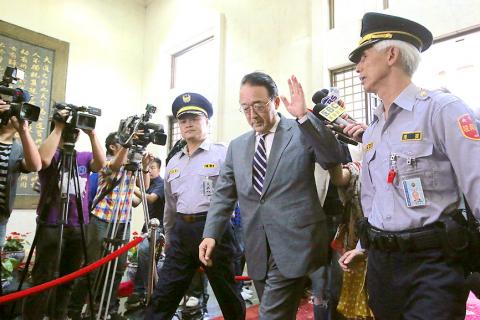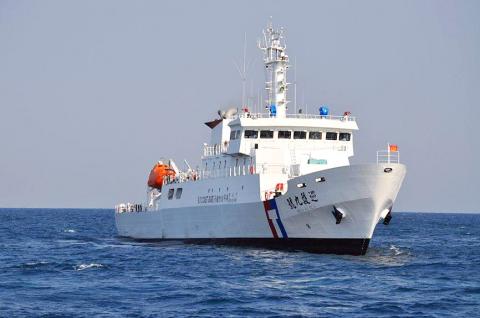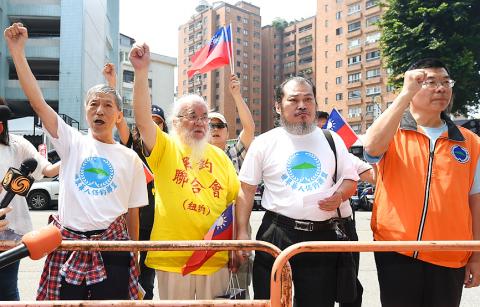Taiwan summoned Japan’s representative yesterday to protest its seizure of a Taiwanese fishing boat in an area where Tokyo claims exclusive rights, while Taipei is sending two vessels — one from the Coast Guard Administration (CGA) and the other from the Council of Agriculture — to the waters around the disputed atoll to defend the rights of the nation’s fishermen.
The 50-tonne Tung Sheng Chi 16 fishing vessel was chased for hours by a Japanese vessel and seized earlier this week, about 150 nautical miles (277.8km) from Okinotori atoll, which is administered by Japan.
The seizure of the fishing boat prompted protest from Taipei, which said Japan had no authority over the area and demanded the release of the ship and 10 crew.

Photo: CNA
They were later freed, but tensions remained.
The release came only after the ship’s owner paid a “deposit” of ¥6 million (US$54,000) demanded by Japanese authorities, the Ministry of Foreign Affairs said in a statement.
Minister of Foreign Affairs David Lin (林永樂) expressed the nation’s displeasure to Japanese Representative to Taiwan Mikio Numata.

Photo: CNA, courtesy of the Coast Guard
“We told them that we have never recognized the exclusive economic zone [EEZ] around Okinotorishima and they had no right to seize the fishing boat,” Lin told reporters.
Okinotori is an uninhabited atoll in the Philippine Sea that is mostly submerged at low tide.
The EEZ claim has also been rejected by China and South Korea, although neither country has made its own claim.

Photo: Liao Chen-huei, Taipei Times
As a show of force, the CGA said that Taiwan would tomorrow dispatch two patrol ships to the area considered high seas by Taiwan near the Japanese-controlled atoll in the western Pacific to protect Taiwanese fishermen operating in the area.
The Legislative Yuan yesterday issued a statement, endorsed by all party caucuses, condemning Japan’s confiscation of the boat and Tokyo’s demand for a security deposit.
Announced by Legislative Speaker Su Jia-chyuan (蘇嘉全), the statement read: “We are here to express our strong denunciation and protest against the Japan Coast Guard’s seizure of Taiwanese fishing boat Tung Sheng Chi No. 16, handcuffing our fishermen, stripping them for examination and usurping NT$1.7 million [US$52,662] as a security deposit in the high seas, which violated human rights, fishing rights and rights to sail in international waters and run afoul of the UN Convention on the Law of the Sea that guarantees the freedom of the high seas.”
According to Article 121 of the convention, an island is a “naturally formed area of land, surrounded by water, which is above water at high tide,” but the Okinotori atoll, which is only 9m2, is a “rock which cannot sustain human habitation or economic life of its own” and therefore does not have an exclusive economic zone or continental shelf, the statement said.
The legislature said it is lodging “serious condemnation and protest” against Tokyo’s alleged breach of the international convention, “arbitrary expansion of its EEZ” and “seizure of our boat,” which are “bullying acts” that have damaged the long-term friendship of the two nations.
Separately, Premier Simon Chang (張善政) asked the Japanese government not to view Taiwan as an “easy target,” saying that South Korean fishing boats were not confiscated in similar situations.
“We will definitely not accept being treated as an easy target,” the premier said. “Taiwanese are friendly toward Japan and Japan should not make our people feel that we are ‘kissing cold butt with a hot face.’”
Additional reporting by Alison Hsiao and CNA

CHAOS: Iranians took to the streets playing celebratory music after reports of Khamenei’s death on Saturday, while mourners also gathered in Tehran yesterday Iranian Supreme Leader Ayatollah Ali Khamenei was killed in a major attack on Iran launched by Israel and the US, throwing the future of the Islamic republic into doubt and raising the risk of regional instability. Iranian state television and the state-run IRNA news agency announced the 86-year-old’s death early yesterday. US President Donald Trump said it gave Iranians their “greatest chance” to “take back” their country. The announcements came after a joint US and Israeli aerial bombardment that targeted Iranian military and governmental sites. Trump said the “heavy and pinpoint bombing” would continue through the week or as long

TRUST: The KMT said it respected the US’ timing and considerations, and hoped it would continue to honor its commitments to helping Taiwan bolster its defenses and deterrence US President Donald Trump is delaying a multibillion-dollar arms sale to Taiwan to ensure his visit to Beijing is successful, a New York Times report said. The weapons sales package has stalled in the US Department of State, the report said, citing US officials it did not identify. The White House has told agencies not to push forward ahead of Trump’s meeting with Chinese President Xi Jinping (習近平), it said. The two last month held a phone call to discuss trade and geopolitical flashpoints ahead of the summit. Xi raised the Taiwan issue and urged the US to handle arms sales to

State-run CPC Corp, Taiwan (CPC, 台灣中油) yesterday said that it had confirmed on Saturday night with its liquefied natural gas (LNG) and crude oil suppliers that shipments are proceeding as scheduled and that domestic supplies remain unaffected. The CPC yesterday announced the gasoline and diesel prices will rise by NT$0.2 and NT$0.4 per liter, respectively, starting Monday, citing Middle East tensions and blizzards in the eastern United States. CPC also iterated it has been reducing the proportion of crude oil imports from the Middle East and diversifying its supply sources in the past few years in response to geopolitical risks, expanding

Pro-democracy media tycoon Jimmy Lai’s (黎智英) fraud conviction and prison sentence were yesterday overturned by a Hong Kong court, in a surprise legal decision that comes soon after Lai was jailed for 20 years on a separate national security charge. Judges Jeremy Poon (潘兆初), Anthea Pang (彭寶琴) and Derek Pang (彭偉昌) said in the judgement that they allowed the appeal from Lai, and another defendant in the case, to proceed, as a lower court judge had “erred.” “The Court of Appeal gave them leave to appeal against their conviction, allowed their appeals, quashed the convictions and set aside the sentences,” the judges